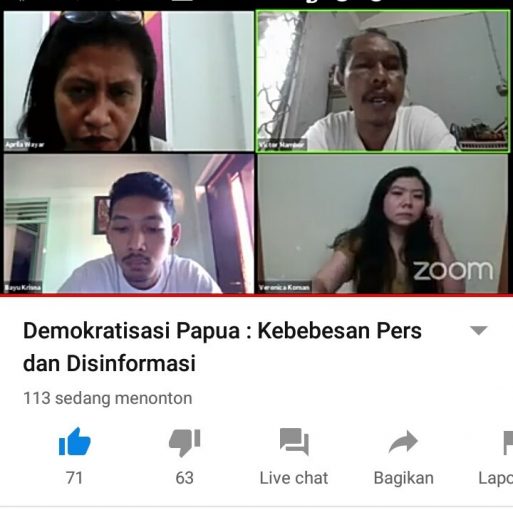
Yogyakarta, 18 July 2020—Korps Mahasiswa Politik Pemerintahan/KOMAP and Dema Fisipol UGM organized virtual discussion Warung Politik under the theme of Freedom of Press and Disinformation in Papua. The discussion was held through Zoom and aired live via DEMA Fisipol UGM’s Youtube channel. Well-known speakers were invited, namely Veronika Koman (working as a human rights lawyer), Victor Mambor (working as a senior journalist focusing on issues of Papua), and Aprilia Wayar (as a writer and member of AJI Yogyakarta). Bayu Krisna, a student of Government and Political Sciences UGM, acted as the moderator.
The event aimed to provide a better understanding of current circumstances in Papua. The discussion began with Bayu throwing a question to all speakers: what is the current condition of press freedom in Papua? According to Viktor, the state of press freedom in Papua has undergone a positive change, as in less obstacles in establishing a media. However, other elements of press did not enjoy the same treatment. Violence against journalists, bribery, and disinformation still occur. In conclusion, press freedom in Papua improved in terms of quantity, but not quality.
Answering the same question, Aprilia added that the improvement occurred in recent five to ten years. However, such improvement did not meet journalists’ expectations. Classic problems persist, such as difficult media access to remote places, limited number of journalists, and negative image fixed on local journalists in Papua. Further commenting on the issue, Veronika Koman affirmed that freedom issues also happened to foreign journalists. Misinformation, Veronika added, occurred massively in Papua and resulted in disinformation and disparity on Papuan history. The condition was exacerbated by the emergence of bot accounts and buzzer propaganda.
The discussion also examined the democratization of Papua. The speakers claimed that the issue of press freedom in Papua, in itself, is a double-edged sword. The ease in establishing new media might provide convenience, but will rear difficulty in sorting out false information from true ones. Such a condition is the consequence of naming oneself a democratic country. Hence, the speakers advised people to learn sorting out credible and trustworthy information from false ones, as press freedom is not only the responsibility of journalists, but also the people and the state.
